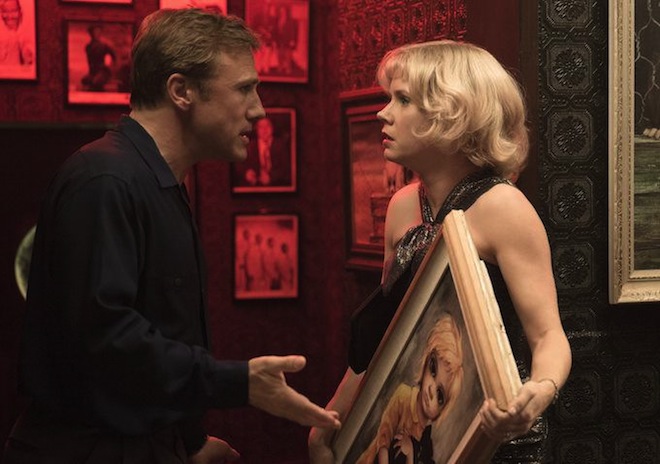 |
| (The Weinstein Company) |
The irony of this film is that it really becomes about Waltz's Walter Keane, and (more specifically) the actor's chewy performance. Amy Adams, top-billed star here as wife Margaret, is provided only a few acting moments to really sink her teeth into, with everything contingent on Mrs. Keane's relationship to Mr. Keane's monster. Waltz is a clown, exclusively interested in his own one-person show. While it might be the point, the depiction of a relationship themed by submission and domination should never feel as thin as it does in Big Eyes.
Director Tim
Burton – an astute art collector of Keane’s works – brings an aesthetically-pleasing flourish to 1960s San Francisco. Margaret escapes an abusive relationship in the suburbs before
heading out West, to make it on her own in California. She meets the Parisian-wannabe
Walter, who convinces Margaret to marry him out of fear (very possibly, her daughter would be taken away if she didn’t). It’s all too sudden (as Margaret's friend DeeAnn, played by an underwhelming Krysten Ritter, reminds us), but she takes it in stride. Walter rents a wall at a shady jazz club and, through Burton's swift method, he's become Walter “Big Eyes” Keane, claiming credit and skyrocketing in popularity for melancholic paintings of children with enlarged pupils – works which were actually painted by Margaret.
The
rest of the film's content lingers in the mind; it almost seems senseless to
recount. The main thread of Big Eyes, though, is Walter's inherent and surfacing insanity. Again, think Nicholson in The Shining: watching Walter toss lit matches into a room where Margaret and her daughter hide, I was expecting Waltz to axe down the door and exclaim, “Here’s Johnny!” Walter also stabs a critic with a fork at a gala when his
failed “masterpiece” – a collage of ethnic children symbolizing nationhood, or
something – gets bad reviews. Aside from making no sense – I assume he
understood critics didn’t like "his" stuff – this kind of Walter-going-nutty scene undermines the dramatic quality
of the film. It comes off as satirical, even though that’s not what it’s trying to be. In all seriousness, the principal tension of the movie is Margaret's coming to the conclusion that she married
a mentally-ill, homicidal con artist. This is all fine and fun,
but it never unearths what actually makes this story captivating: her
decision to marry such a man, to succumb to his domination, to forfeit her
artistic integrity. How a man might wield that power over this woman seems like
the obvious point-of-view Burton (and Waltz) should have been telling this story from.
The
frustration here is Burton’s clear ability to actually entertain – there are moments in this movie that work well. He directs Adams in a way where she expresses a lot with her eyes – all
the characters do, in fact – and it allows the actress to make interesting visual and emotional choices. When Walter finds Margaret painting in another
style, asserting herself in the only way she knows how, her fearful, beady blue
eyes communicate deep timidity and hurt. Those moments when she’s scared,
apprehensive, or worried are penetratingly dramatic. Maybe it’s a sadistic consideration, but I
was hoping they would put her through the wringer just a little bit more than they
did; or maybe, not merely in the Walter-is-going-to-physically-torture-you way. Adams can't go especially deep in this piece, unfortunately – when you’re working alongside a
self-satisfied attention-hog, it’s difficult to create a believable relationship.
Margaret moves to Hawaii because, well, “it’s paradise,” and with large sums in the bank she realizes that she can. Here, on the radio, she announces that she is the real
painter. The climatic courtroom scene that follows is as broadly comic and shamelessly fun as Burton intends (and, apparently, toned down from what actually happened). The judge is humorously annoyed as Walter – was Jim Carrey Waltz's acting coach for this last scene? – plays both defendant and attorney, running back and forth between the witness stand and the attorney's table before he calls himself
forth. Burton wants us to enjoy watching this insane man get what he deserves, but it's ultimately a misjudgment. For the
feminist zing he imbues the work with, Burton intends a work of comedy as well.
How else do you explain this pouncing mad-man routine?
Margaret’s
arc in this elongated final scene – in which she finally learns to stand up for herself – is as touching as corny courtroom speeches get. She finds Jehovah and teaches herself that she
has value. Regardless of the film's value, I left with a new appreciation for Ms. Keane
– the works that litter this underwhelming if decent movie impressed me, and Burton's high opinion of her is well-translated. The staleness of Big Eyes can be attributed to Waltz, who prevents the
movie from taking a step further, and somewhat to Burton, who lazily stays out of his way. But while there are some plain-ridiculous
moments – when the eccentric cast discovers the secret behind the Keane family,
I nearly gagged – Burton and Adams work well together to
give Margaret Keane a serviceable cinematic nod.
Burton
overreaches sometimes – Margaret seeing her "eyes" in people around her is purely ineffective, and to call Danny Huston's voice-over unnecessary would be generous. But he gives the film its
color. It’s pretty mild and familiar, but there's a charm amidst its various faults. Could
this have been a deeper examination? Positively. Burton went for something more playful. It falls within the realm of such entertaining stylistic pieces as Gone Girl or Birdman which – if examined and broken
down – aren't quite the sum of their parts. They nonetheless make for pleasant viewing. If Big Eyes indicates anything: Tim
Burton may have fallen from grace, but he can still string together a fair and entertaining movie.
Grade: B-